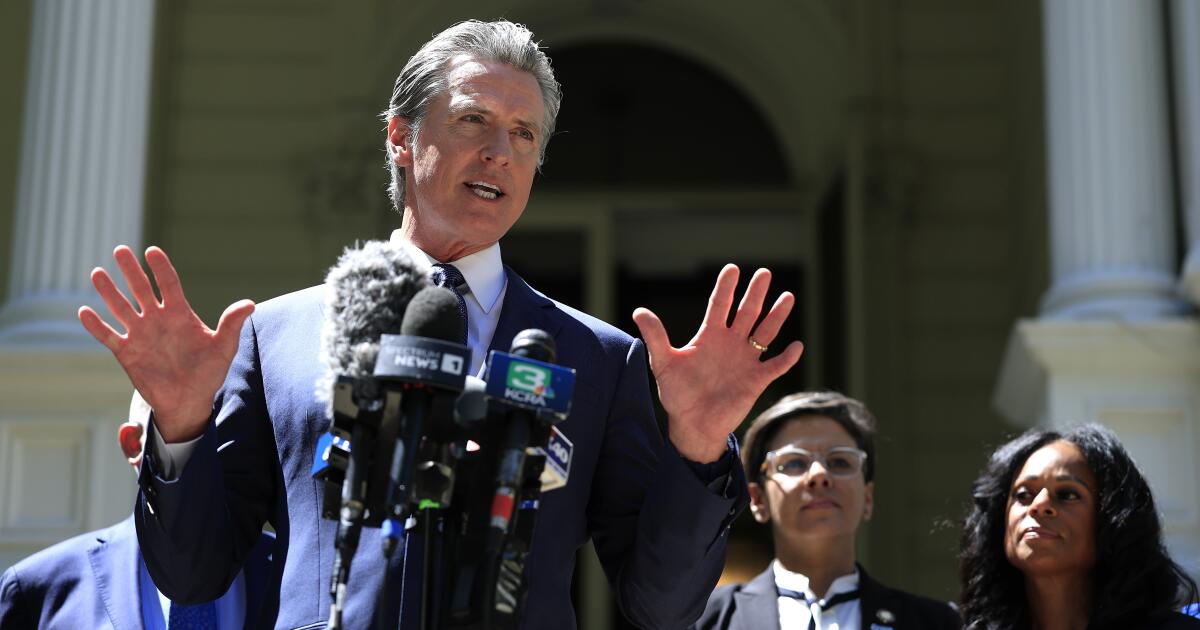Friday, June 26, is the Supreme Court docket’s closing day of issuing opinions on the deserves docket for the 2024-25 time period. The courtroom has six instances left to resolve, on matters starting from the constitutionality of Louisiana’s congressional map to the facility of federal district judges to difficulty nationwide injunctions.
Listed below are transient summaries of the six remaining instances, together with (when doable) predictions about which justice may be writing which opinion.
Free Speech Coalition v. Paxton (argued Jan. 15): This case stems from a problem by a commerce group for the grownup leisure business to a 2023 Texas regulation that requires pornography websites to confirm the age of their makes use of earlier than offering entry. The regulation applies to any web site whose content material is one-third or extra “dangerous to minors.” The query that the justices agreed to resolve was whether or not the U.S. Court docket of Appeals for the fifth Circuit correctly utilized a much less stringent constitutional check, referred to as rational foundation evaluate, when reviewing the regulation, or whether or not it ought to have as a substitute utilized a extra stringent commonplace, referred to as strict scrutiny.
The justices attempt to unfold out the workload evenly over the course of the time period but in addition on a month-to-month foundation. The one justice who has not but written an opinion for the courtroom’s January argument session is Justice Clarence Thomas, which strongly suggests that he’s writing in Free Speech Coalition (which, based mostly on his questions at oral argument, ought to bode nicely for Texas).
Louisiana v. Callais (argued March 24): This can be a dispute over a congressional map that the Louisiana Legislature adopted final yr. After a federal courtroom dominated, in a separate lawsuit, {that a} 2022 map containing one majority-Black district doubtless violated the Voting Rights Act, the Legislature enacted a brand new map, which contained two majority-Black districts. A gaggle of voters describing themselves as “non-African American” challenged the 2024 map, contending that it was an unconstitutional racial gerrymander – that’s, that it sorted voters based mostly totally on their race. Defending the brand new map, the state contended that race was not the motivating issue behind the brand new map. As an alternative, it argued, it drew the map because it did to guard a number of high-profile Republican incumbents, similar to Speaker of the Home Mike Johnson and Rep. Julia Letlow, who sits on the highly effective Home Appropriations Committee.
Federal Communications Fee v. Shoppers’ Analysis (argued March 27): This case is a problem to the federal “E-rate program,” which subsidizes phone and high-speed web companies in faculties, libraries, rural areas, and low-income communities in city areas. Cash for the subsidies comes from the Common Service Fund, created by Congress and funded by way of contributions from telecommunications carriers; a personal nonprofit created by the FCC, referred to as the Common Service Administrative Firm, administers the fund. A client safety group that has (amongst different issues) not too long ago devoted itself to preventing “woke” companies contends that the scheme violates the nondelegation doctrine – the concept Congress can not delegate its legislative powers to different entities.
There are two instances left from the courtroom’s March argument session, and three justices haven’t but written opinions: Justices Elena Kagan, Brett Kavanaugh, and Amy Coney Barrett.
Kennedy v. Braidwood Administration (argued April 21): This case is a problem to the constitutionality of the construction of the U.S. Preventive Providers Job Power, an unbiased panel of consultants with the facility underneath the Inexpensive Care Act to find out which preventive companies insurers should cowl. The plaintiffs within the case, who’ve spiritual objections to the requirement that insurers present protection for a drug that forestalls HIV, contend that the Structure requires members of the duty drive to be appointed by the president and confirmed by the Senate.
Mahmoud v. Taylor (argued April 22): On this case, the justices are deciding whether or not it violates the spiritual beliefs and due to this fact the First Modification rights of a gaggle of Maryland mother and father to require their kids to take part in instruction at their public faculties that features LGBTQ+ themes. The mother and father, who’re Muslim, Catholic, and Ukrainian Orthodox, need to have the ability to decide their kids out of instruction involving LGBTQ-themed storybooks.
Solely three justices – Samuel Alito, Ketanji Brown Jackson and Kagan – haven’t but written opinions for April. The probably state of affairs has Alito writing Mahmoud and both Kagan (extra doubtless) or Jackson writing Braidwood.
Trump v. CASA (argued Could 15): Though these instances started as a problem to President Donald Trump’s government order ending birthright citizenship – the assure of citizenship to just about everybody born in the US – they got here to the justices as an emergency enchantment during which the Trump administration is asking the justices to weigh in on a unique query: the facility of federal district courts to difficulty “nationwide” or “common” injunctions, which prohibit the federal authorities from implementing the birthright citizenship order anyplace within the nation.
As a result of that is the one opinion anticipated from Could (when the justices don’t usually hear instances), all bets are theoretically off as to the writer. However this looks as if one which Chief Justice John Roberts is more likely to take for himself – or it might come as an unsigned (or “per curiam,” that means “for the courtroom”) opinion
Posted in Featured, Deserves Circumstances
Circumstances: Free Speech Coalition, Inc. v. Paxton, Louisiana v. Callais, Mahmoud v. Taylor, Kennedy v. Braidwood Administration, Inc., Federal Communications Fee v. Shoppers’ Analysis, Trump v. CASA, Inc.
Really useful Quotation:
Amy Howe,
The instances that stay,
SCOTUSblog (Jun. 26, 2025, 7:47 PM),
https://www.scotusblog.com/2025/06/remaining-supreme-court-cases/





![JOB POST: Patent Searching Professional at Khurana & Khurana [Multiple Location; 3+ years PQE; Patent Searching]: Apply Now!](https://i1.wp.com/cdn.lawctopus.com/wp-content/uploads/2025/07/JOB-POST-Patent-Searching-Professional-at-Khurana-Khurana.jpg?w=350&resize=350,250&ssl=1)















